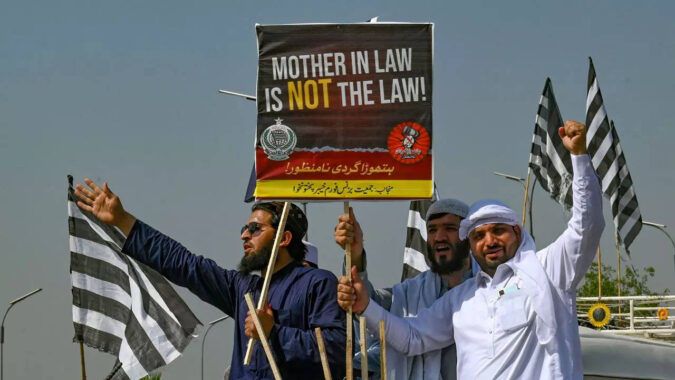NEW DELHI: Pakistan Supreme Court chief justice Umar Ata Bandial has found himself in the crosshairs of the ruling coalition after granting relief to ousted prime minister Imran Khan last week.
Angry protesters belonging to the Pakistan Democratic Movement (PDM) are brandishing posters saying “mother-in-law is not the law” to target the top judge over his alleged judicial favouritism.
Last week, PDM chief Maulana Fazlur Rehman had lashed out at the Supreme Court’s decision to declare Khan’s arrest as invalid, saying that the top judiciary was showing partiality towards him.
“The court should behave as the mother of law and not as mother-in-law,” he said.
What’s the ‘mother-in-law’ connection?
Rehman’s “mother-in-law” jibe was made in reference to a recent audio clip of the mother-in-law of chief justice Bandial who is heard expressing her anxiety over Khan not getting relief from the courts.
The purported audio clip, which was leaked last month, was of a conversation between the Pakistani CJ, his mother-in-law Mahjabeen Noon and Pakistan Tehreek-e-Insaf (PTI) lawyer Khawaja Tariq Rahim’s wife Rafia Tariq.
In the clip, Noon can be heard airing her concern for the chief justice, saying that she has been praying for him amid tensions between the judiciary and the government after Bandial ordered elections in Pakistan Punjab.
The trio were also heard wishing for snap elections, media reports said.
Noon’s apparent favouritism towards Imran Khan is now being used by the former PM’s detractors to attack the CJP.
Last week, PML-N leader Maryam Nawaz had advised CJP Bandial to resign from his position and join the PTI, “just like his mother-in-law”, alleging that Noon is a part of Imran’s party.
Earlier too, after the release of the audio clip, Maryam had expressed concern that court decisions were being made on the basis of “likes and dislikes of wives and mothers-in-law”, rather than on the basis of constitution and law.
Khan was on Friday granted bail by the Supreme Court of Pakistan after the National Accountability Bureau (NAB) arrested the ousted prime minister in a corruption case.
Khan’s arrest by the Pakistan Rangers at the IHC premises last Tuesday triggered unrest in Pakistan that continued till Friday and led to several deaths and dozens of military and state installations being destroyed by the protesters.
For the first time in the country’s history, the protesters stormed the army headquarters (GHQ) in Rawalpindi and also torched the historic Corps Commander’s House in Lahore.
Police put the death toll in violent clashes to 10 while Khan’s party claims 40 of its workers lost their lives in the firing by security personnel.
(With inputs from agencies)
Angry protesters belonging to the Pakistan Democratic Movement (PDM) are brandishing posters saying “mother-in-law is not the law” to target the top judge over his alleged judicial favouritism.
Last week, PDM chief Maulana Fazlur Rehman had lashed out at the Supreme Court’s decision to declare Khan’s arrest as invalid, saying that the top judiciary was showing partiality towards him.
“The court should behave as the mother of law and not as mother-in-law,” he said.
What’s the ‘mother-in-law’ connection?
Rehman’s “mother-in-law” jibe was made in reference to a recent audio clip of the mother-in-law of chief justice Bandial who is heard expressing her anxiety over Khan not getting relief from the courts.
The purported audio clip, which was leaked last month, was of a conversation between the Pakistani CJ, his mother-in-law Mahjabeen Noon and Pakistan Tehreek-e-Insaf (PTI) lawyer Khawaja Tariq Rahim’s wife Rafia Tariq.
In the clip, Noon can be heard airing her concern for the chief justice, saying that she has been praying for him amid tensions between the judiciary and the government after Bandial ordered elections in Pakistan Punjab.
The trio were also heard wishing for snap elections, media reports said.
Noon’s apparent favouritism towards Imran Khan is now being used by the former PM’s detractors to attack the CJP.
Last week, PML-N leader Maryam Nawaz had advised CJP Bandial to resign from his position and join the PTI, “just like his mother-in-law”, alleging that Noon is a part of Imran’s party.
Earlier too, after the release of the audio clip, Maryam had expressed concern that court decisions were being made on the basis of “likes and dislikes of wives and mothers-in-law”, rather than on the basis of constitution and law.
Khan was on Friday granted bail by the Supreme Court of Pakistan after the National Accountability Bureau (NAB) arrested the ousted prime minister in a corruption case.
Khan’s arrest by the Pakistan Rangers at the IHC premises last Tuesday triggered unrest in Pakistan that continued till Friday and led to several deaths and dozens of military and state installations being destroyed by the protesters.
For the first time in the country’s history, the protesters stormed the army headquarters (GHQ) in Rawalpindi and also torched the historic Corps Commander’s House in Lahore.
Police put the death toll in violent clashes to 10 while Khan’s party claims 40 of its workers lost their lives in the firing by security personnel.
(With inputs from agencies)
